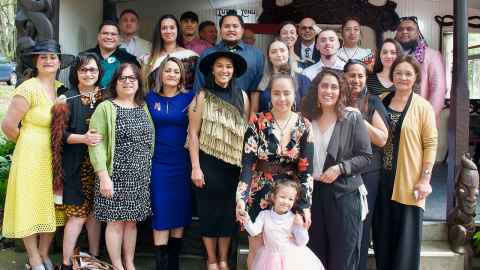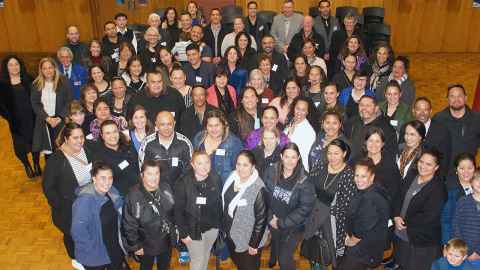25 years of regenerating Te Reo Māori
15 September 2021
The innovative Huarahi Māori programme celebrates its 25th anniversary this year. Based in Te Puna Wānanga in the Faculty of Education and Social Work, the programme is underpinned by tikanga Māori and mātauranga Māori.

It was established to create teachers who are proficient in te reo Māori and who know how to teach in a te reo immersion classroom, to address the teacher shortage in Māori medium schools.
More than 370 students have since graduated from Te Puna Wānanga, spread across the Māori medium and wider educational sector, from Kura Kaupapa Māori and Kura ā-iwi, to immersion, bilingual and mainstream classrooms, as well as secondary schools.
Te Puna Wānanga senior academics Tony Trinick and Hēmi Dale have led the development of the Pāngarau (Māori medium mathematics) and Tikanga ā-Iwi (Māori medium social sciences) learning areas from the early 1990s.
“Through our long engagement with curriculum development there has been a flow-on effect for our students in that we have been able to position them at the crest of the wave in terms of each new iteration of curriculum and pedagogy,” says Hēmi.
An additional element has been the development of a body of work to meet the linguistic demands of academic learning through the medium of te reo Māori.
Over time, students continue their own linguistic journeys as te reo speakers and contributors to the regeneration of te reo Māori in education and the wider community.
The first iteration of the Huarahi Māori programme glossary was produced in 1999 as an intervention to support students’ acquisition of key educational terms in te reo Māori. Since then, the educational glossary has continued to grow to include around 2500 educational terms.
“At a macro level, the papakupu has been an important part of our strategy to actively support the process of the intellectualisation of te reo Māori,” says Hēmi. “Over time, students continue their own linguistic journeys as te reo speakers and contributors to the regeneration of te reo Māori in education and the wider community.”
Tony Trinick says the programme does have a significant level of independence from the English programmes.
“It isn’t subordinate in any way to the English medium programme,” he says.
Huarahi Māori’s senior lecturer Tauwehe Tamati is a key figure in the development of many of the Huarahi Māori programmes and recalls some resistance in the early days.
“I was told what to teach by English medium colleagues who didn’t realise we were our own programme. It took a few years in what was then the Auckland College of Education for our English medium colleagues to realise that the ‘M’ in our programme codes meant much more than just the letter.”

She says they’ve worked hard over the years to create an academic and linguistic environment for students to thrive in as Māori within the University of Auckland.
“Ultimately, our programme goals align with our students and graduates, that is ‘Kia tū tangata rātou i te ao mātauranga me te ao Māori anō hoki.’ [‘That our students stand tall and confidently in both the educational and Māori worlds’].”
Look out for the book, Huarahi Māori: Celebrating 25 years of success in Māori medium Initial Teacher Education edited by Tauwehe Tamati, Peter Keegan, Tania Cliffe-Tautari and Ruth Lemon.
Due for release next year, this book documents and details key aspects of the University of Auckland’s Huarahi Māori Initial Teacher Education (ITE) programme, which is based in Auckland and Whangārei.
The book describes key factors in the programme’s success and longevity, including the contribution of kaumātua/kuia, pūkenga, tohunga, pouako and tauira, along with the role of the campus marae, the faculty and wider Māori education community.
Congratulations to all the staff, students, and graduates of the Huarahi Māori programme.
Media contact
Julianne Evans | Media adviser
M: 027 562 5868
E: julianne.evans@auckland.ac.nz